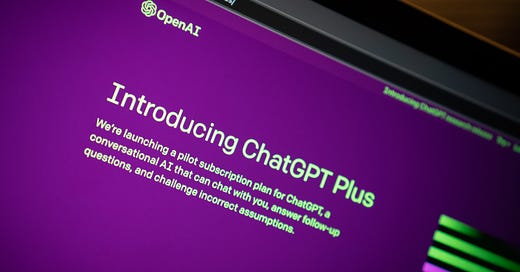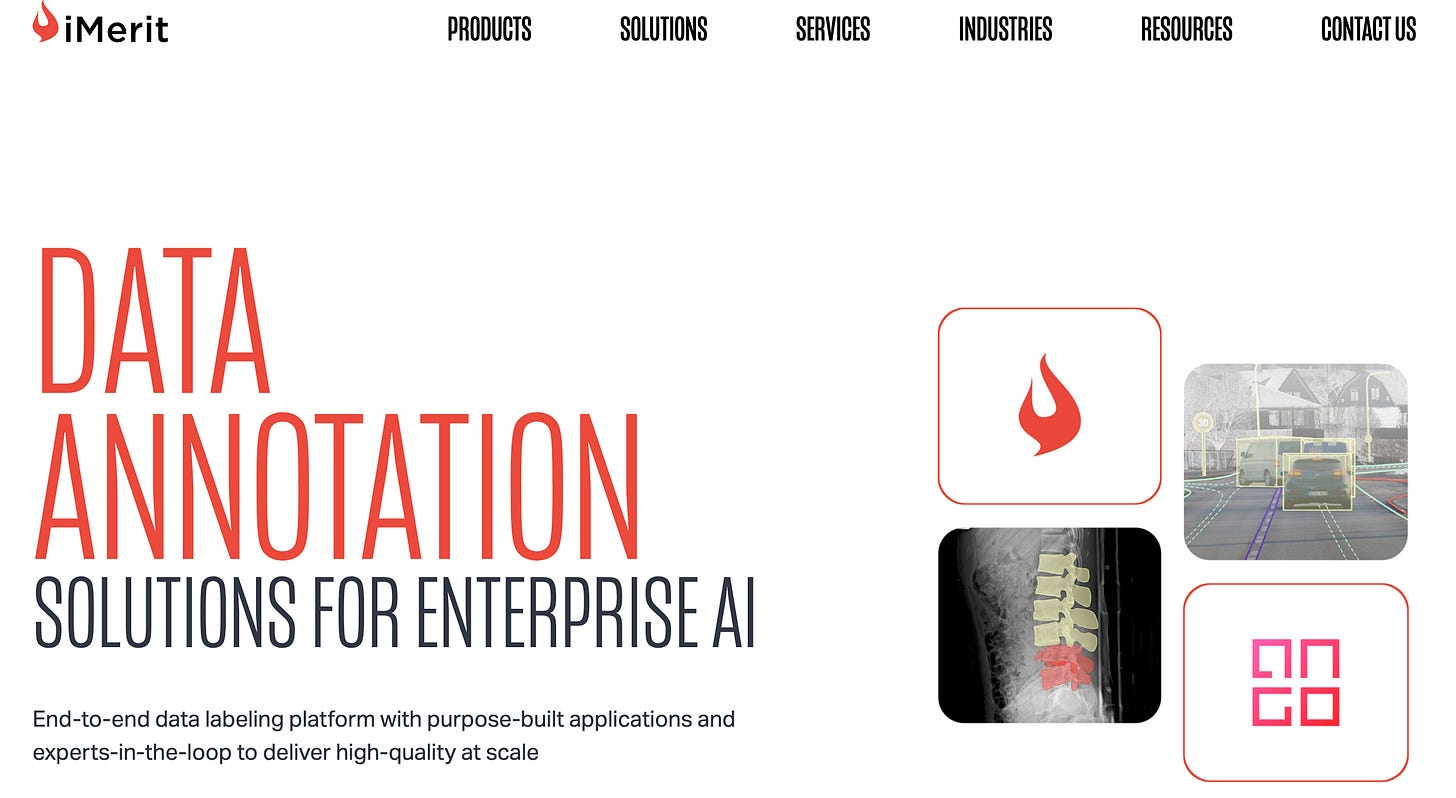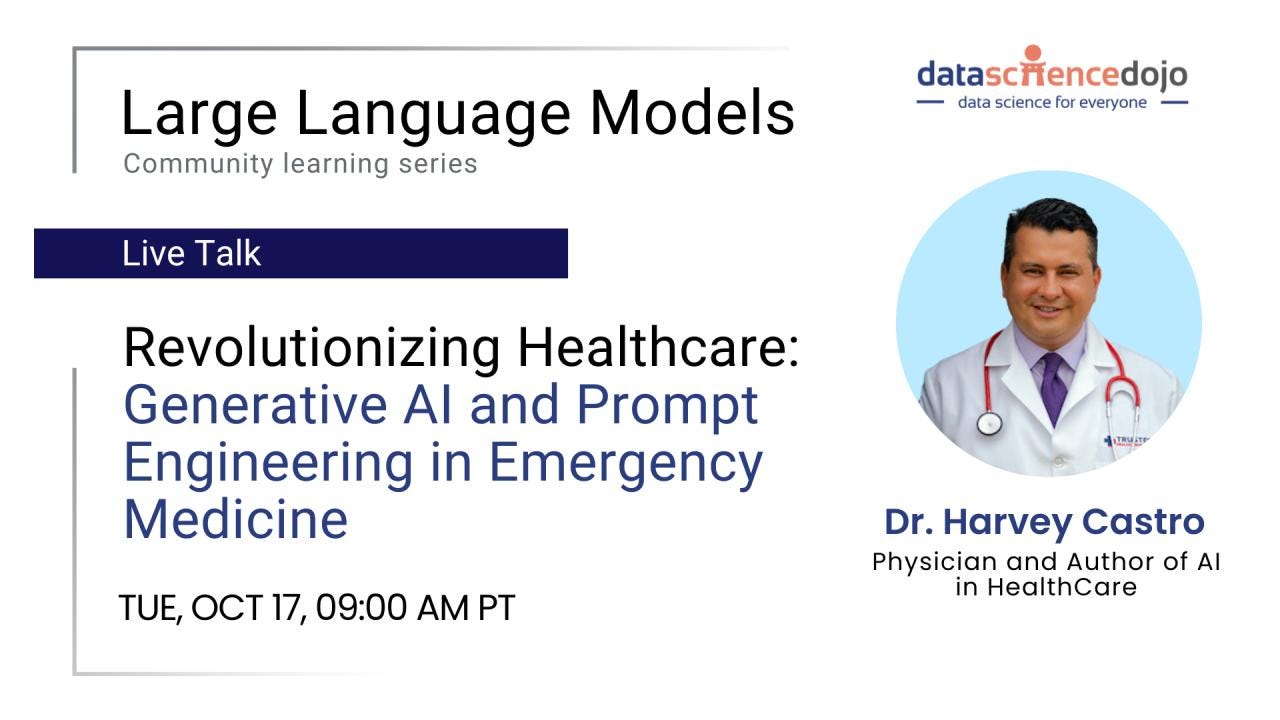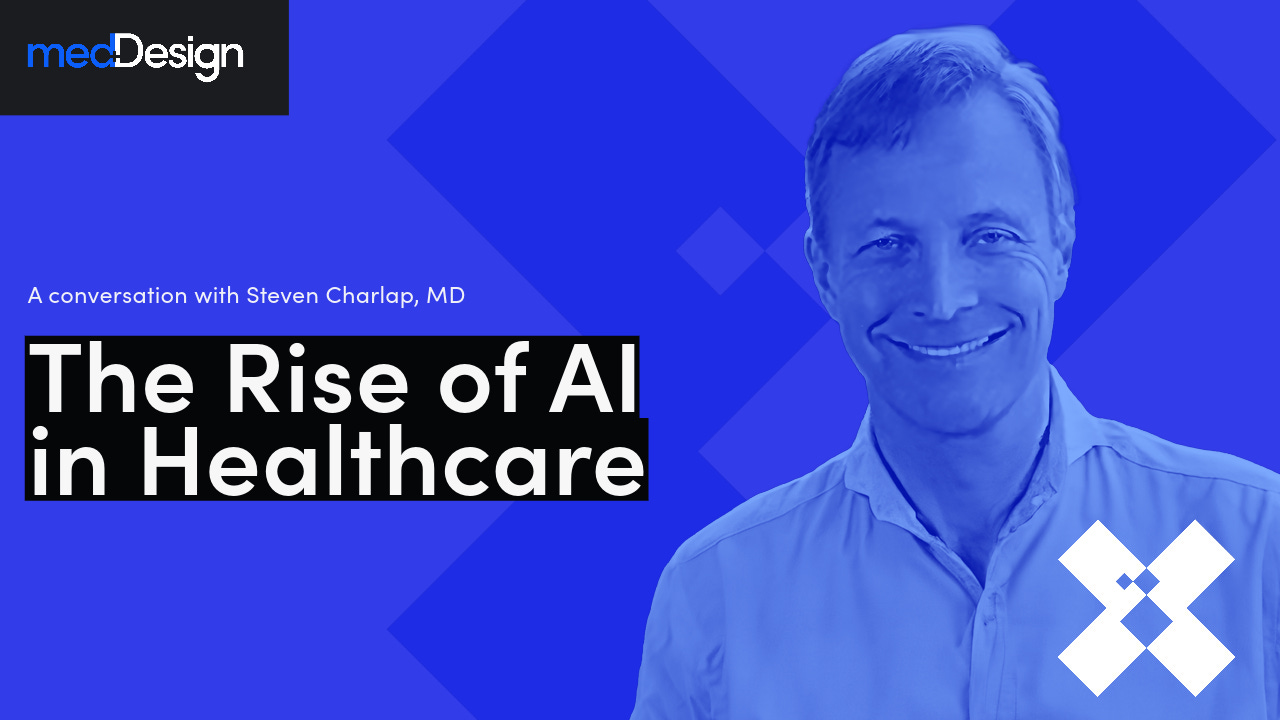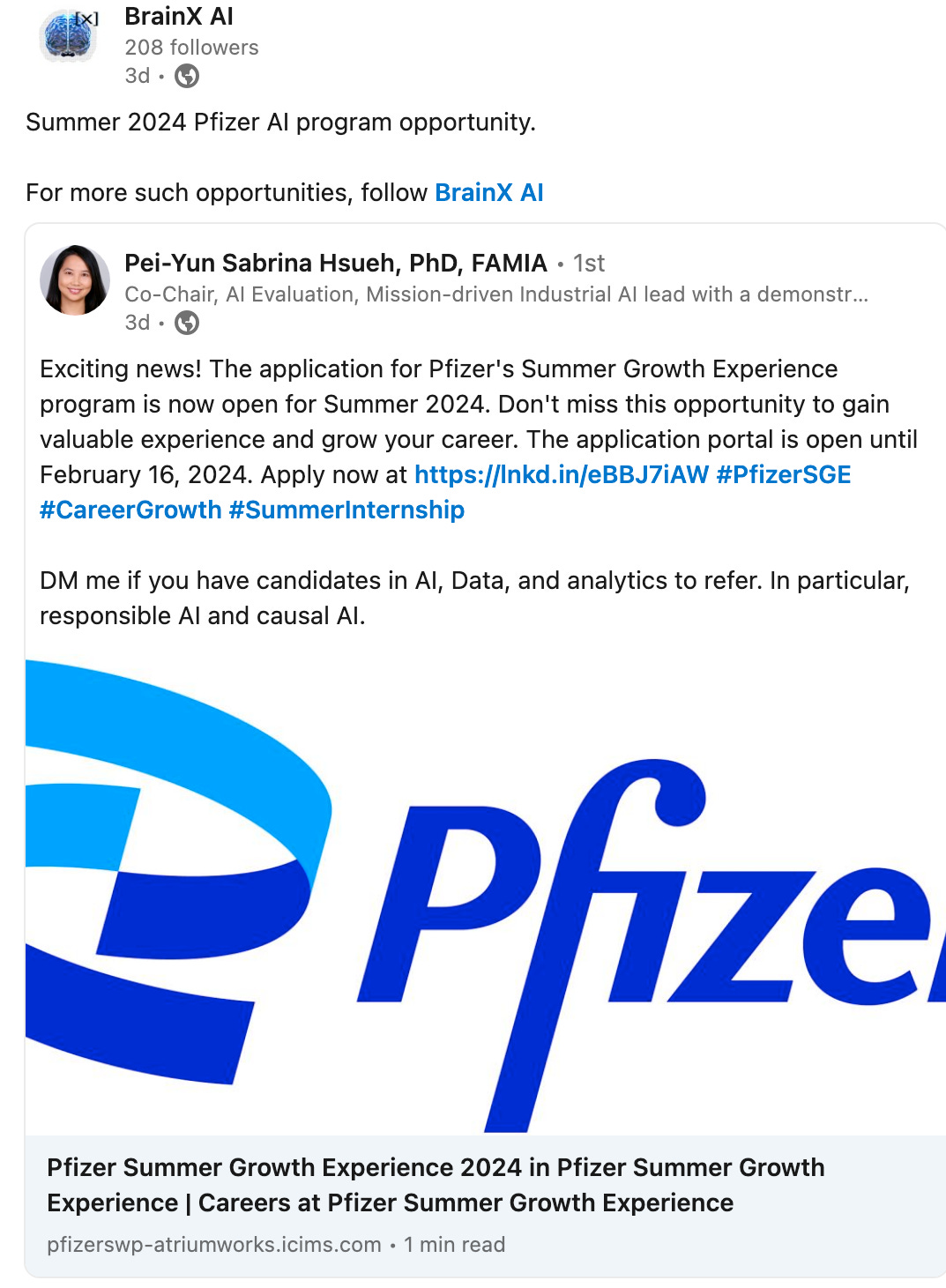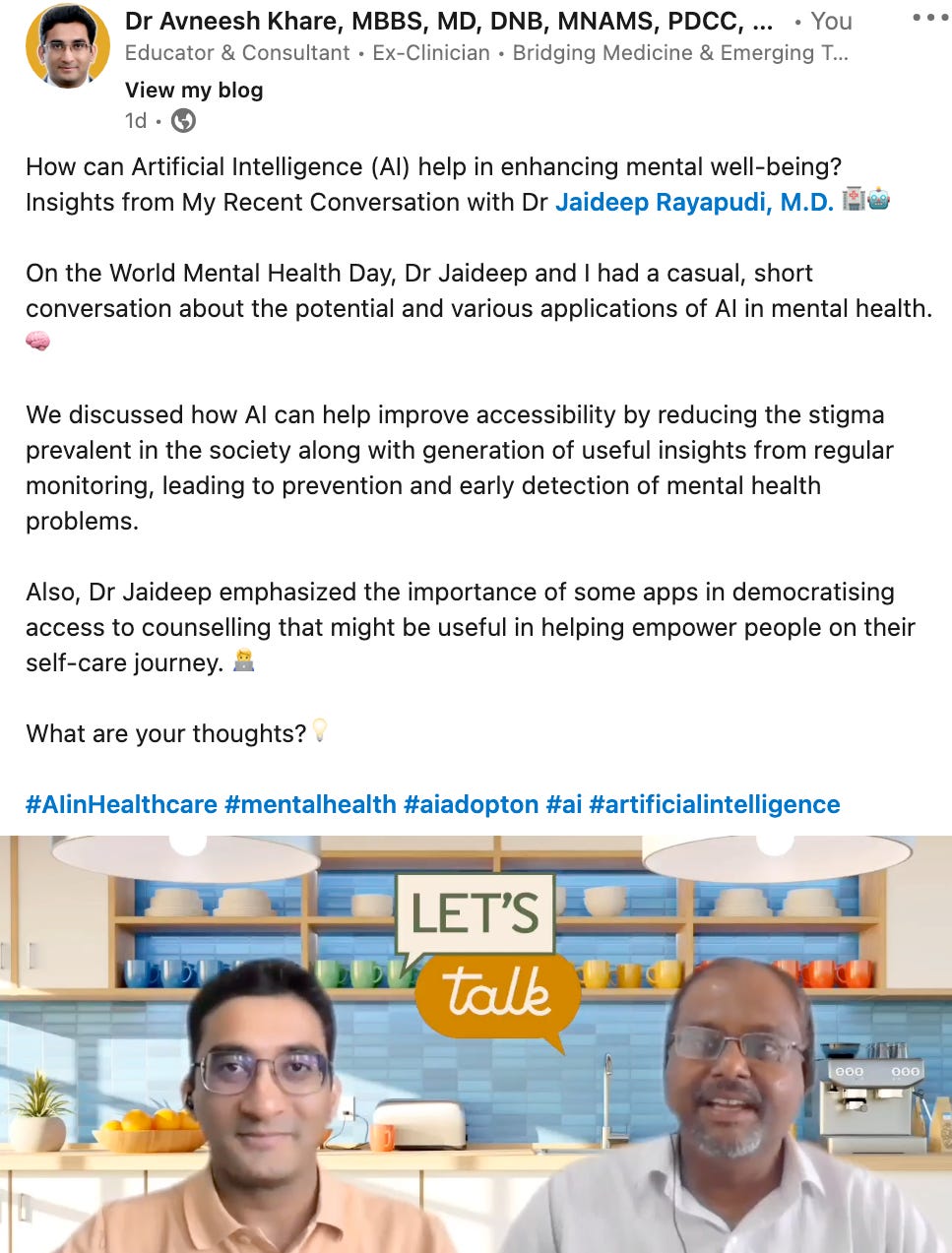🏥 Unlocking Tomorrow's Healthcare: Microsoft's New AI Tools, Google's Generative AI Search, ChatGPT's Milestone, and More! 🔍
Weekly Updates on AI in Medicine 🤖🩺🚀
“As more and more artificial intelligence is entering into the world, more and more emotional intelligence must enter into leadership.” - Amit Ray, Famous AI Scientist, Author of Compassionate Artificial Intelligence
Dear Med AI Enthusiast,
Welcome to this edition of The ‘Med AI’ Capsule Weekly Newsletter! ⚕️🤖💊 I'm really excited to have you with me as we dive into the fascinating world of Medical AI.
In this newsletter, I'll be your guide, taking you through the latest news updates and thought-provoking ideas in the ever-changing field of artificial intelligence in medicine.
Whether you're an interested medical professional, a tech enthusiast, or just curious about the future of medicine, The ‘Med AI’ Capsule is here to lead the way and show you the exciting possibilities and cautionary areas for AI in medicine.
So, get ready for an adventure, and let's explore this thrilling journey together! 🚀
In today’s capsule:
5 Med AI News Updates
3 Med AI Research Updates
2 Med AI Events
1 Med AI Work Opportunity
Social Post of the Week
Reading Time: 5-7 minutes
Med AI News Updates 📰
🏥 Microsoft Introduces AI Tools to Streamline Healthcare Data 🤖
Why Important: Microsoft's new AI tools simplify healthcare data management, enabling healthcare providers to efficiently access and consolidate information from various sources. This improves patient care by reducing time spent on data retrieval.
Caution: Data security and accurate implementation are critical considerations for successful adoption.
🧠 AI Speeds Up Brain Tumor Diagnosis During Surgery 🤖
Why Important: AI technology now allows neurosurgeons to identify brain tumor types within 1.5 hours, a process that used to take a week. This real-time diagnosis empowers surgeons to adjust their strategies immediately, improving patient care.
Caution: While this technology holds great promise, further research is needed to expand its applicability to more tumor types and ensure long-term benefits for patients.
🏥 Google's AI-Powered Search Enhances Healthcare Information Access 🤖
Why Important: Google Cloud's new AI search tool simplifies the retrieval of clinical information from various sources, streamlining healthcare workers' access to critical data. This technology saves time and improves efficiency in patient care.
Caution: While promising, successful integration into healthcare workflows and building trust in AI are essential for widespread adoption. Early trials show potential, but scaling this innovation requires careful planning.
🏥 Patient Education Crucial for AI Trust in Healthcare, Survey Shows 🤖
Why Important: A recent survey by GlobalData highlights the significance of patient education in building trust in AI-driven healthcare settings. While 60% of patients familiar with AI are comfortable with AI-enabled healthcare, this comfort level drops to just 7% for those unfamiliar with the technology.
Caution: The top concern among patients is the lack of in-person interaction when physicians use AI in clinical practice. To enhance AI adoption and mitigate biases, patient education should focus on explaining AI's benefits and risks.
👨⚕️ MoS, Science and Technology, GoI Proposes AI and Quantum Upskilling for Medics 🤖
Why Important: Union Minister Dr. Jitendra Singh has proposed upskilling healthcare professionals in AI, Quantum, and emerging technologies to adapt to evolving patient care needs. Continuous skill development, especially among young professionals, is crucial for meeting India's healthcare demands and preserving its growing youth resource pool.
Caution: The overloaded medical curriculum, inadequate teacher training, and a lack of tailored online courses pose challenges for integrating AI and Quantum education in medical programs.
Med AI Industry Showcase 📢
iMerit is a trusted and secure data annotation and labeling company that provides high-quality data enrichment and annotation services for artificial intelligence and machine learning applications.
iMerit has 10+ years of experience in data annotation solutions across industries like autonomous mobility, healthcare, technology, agriculture, and more.
More than 5,500 iMeriters in the United States, Europe, Bhutan and India work with many of the most innovative companies in the Artificial Intelligence and Machine Learning ecosystems, to unlock the value hidden deep within large volumes of unstructured datasets.
Their customers are able to focus on the algorithms that drive their company forward, while iMerit's teams of trained specialists empowered with AI tools handle the data work.
With an output accuracy above 98%, iMerit is recognized as the leader in delivering quality, cost-effective projects on time and on budget.
If you want your ‘MED AI’ company/ startup/ product to be featured here, please feel free to reach out to me at avneeshkhareonline@gmail.com.
Med AI Research Updates 🔬
📊 Deep Learning Predicts Rectal Cancer Response to Neoadjuvant Chemotherapy 🤖
Key Findings: The model achieved a sensitivity of 77.6%, specificity of 62.9%, and an accuracy of 71.4% in predicting poor response to neoadjuvant therapy, offering potential for enhanced treatment planning.
Limitations: A small sample size (53 patients) warrants larger, diverse studies for clinical reliability, and complementary clinical indicators may further enhance prediction accuracy.
🧠 Medical Students' Views on AI in Healthcare: A Study from Sultan Qaboos University 🤖
Key Findings: A significant proportion of clinical-year medical students in Oman (75.4%) had no prior exposure to AI in healthcare. The students had a moderate median knowledge score of 3.25 out of 5 in AI, and this score did not show substantial improvement over the years. Despite limited knowledge, the students held positive perceptions and attitudes toward AI in healthcare.
Limitations: The study is limited by potential biases in self-reported data, non-response bias, and a narrow focus on specific AI terms, calling for broader and more diverse research to gain comprehensive insights.
📊 ChatGPT's Impact in Medical Literature and Healthcare 🤖
Key Findings: ChatGPT garners over 1000 PubMed citations by August 2023, highlighting its potential to revolutionize medical academia and impact patient care. However, a significant portion of these citations comprises editorials or commentaries, indicating a need for more empirical research.
Limitations: Despite its rapid citation growth (achieved in nine months, compared to Google's 14 years), issues concerning data protection, patient privacy, and ethics are gaining prominence.
Med AI Events 🧑💻
Med AI Work Opportunity 💼
Social Post of the Week 📲
Let’s wrap it up with a fun fact!
A scientist named Carl Djerassi not only developed the birth control pill, but also wrote over 1200 papers on different subjects, and wrote one of the first Artificial Intelligence programs in 1965. A program called DENDRAL, which could automatically discover unknown forms of medications. – Source
Stay tuned for our upcoming editions as we explore the latest breakthroughs and dive deep into AI's transformative power, shaping a healthier future.
Warm regards,
P.S.: If you're a medical professional intrigued by artificial intelligence, but not sure where to start, feel free to reach out to me for personalised guidance HERE.
You can also check out my CPD-accredited ‘Med AI’ course on the Bionabu (UK) platform and join our vibrant Med AI WhatsApp Community for Medical Professionals.
Follow me on LinkedIn and Twitter
Voluntary Disclosure: Generative AI tools were employed to help me in making this newsletter better for you.

